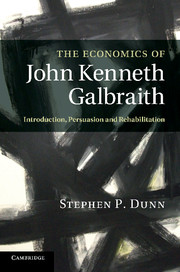Book contents
- Frontmatter
- Contents
- List of figures
- List of tables
- Foreword
- Preface
- Acknowledgments
- 1 The eclipse of The New Industrial State?
- 2 A life in our times
- 3 The economics of John Kenneth Galbraith
- 4 The methodology of John Kenneth Galbraith
- 5 The general theory of advanced development
- 6 Why people are poor
- 7 Uncertainty and the modern corporation
- 8 A theory of the multinational corporation
- 9 The management of specific demand
- 10 Money and the real world
- 11 A man for our times
- 12 The origins of the Galbraithian system: talking to John Kenneth Galbraith
- References
- Additional works by Galbraith
- Index
6 - Why people are poor
Published online by Cambridge University Press: 10 January 2011
- Frontmatter
- Contents
- List of figures
- List of tables
- Foreword
- Preface
- Acknowledgments
- 1 The eclipse of The New Industrial State?
- 2 A life in our times
- 3 The economics of John Kenneth Galbraith
- 4 The methodology of John Kenneth Galbraith
- 5 The general theory of advanced development
- 6 Why people are poor
- 7 Uncertainty and the modern corporation
- 8 A theory of the multinational corporation
- 9 The management of specific demand
- 10 Money and the real world
- 11 A man for our times
- 12 The origins of the Galbraithian system: talking to John Kenneth Galbraith
- References
- Additional works by Galbraith
- Index
Summary
In a world where everyone is poor, there is nothing very remarkable about poverty. It becomes remarkable, and also less forgivable, in a community where the great majority of people are well-to-do. And the explanation for poverty in the well-to-do society must be sought in the general and not the particular aspects of the case – not in the nature of the society of the poor but in the nature of a society of the rich which allows or requires some to stay so poor.
J. K. Galbraith (1958a: 20)Polls also suggest that the public both understand the role of growing inequality and supports government action to do something about it. A massive Pew survey of trends in public opinion found that the fractions of the public agreeing that the rich are getting richer while the poor get poorer, that the government has a responsibility to help those in need, that everyone should be guaranteed enough to eat and a place to live, have all risen to levels not seen since the early 1990s. All this suggests that there's an opportunity for a major push toward policies that address inequality and/or economic insecurity.
Paul Krugman (2007: 202)In the early 1950s Galbraith obtained a grant from the Carnegie corporation to study the causes of pockets of poverty in substantial areas of the USA. This was the beginning of The Affluent Society. The title that Galbraith (1958a: 20) had in mind at that time was “Why people are poor.”
- Type
- Chapter
- Information
- The Economics of John Kenneth GalbraithIntroduction, Persuasion, and Rehabilitation, pp. 146 - 173Publisher: Cambridge University PressPrint publication year: 2010



